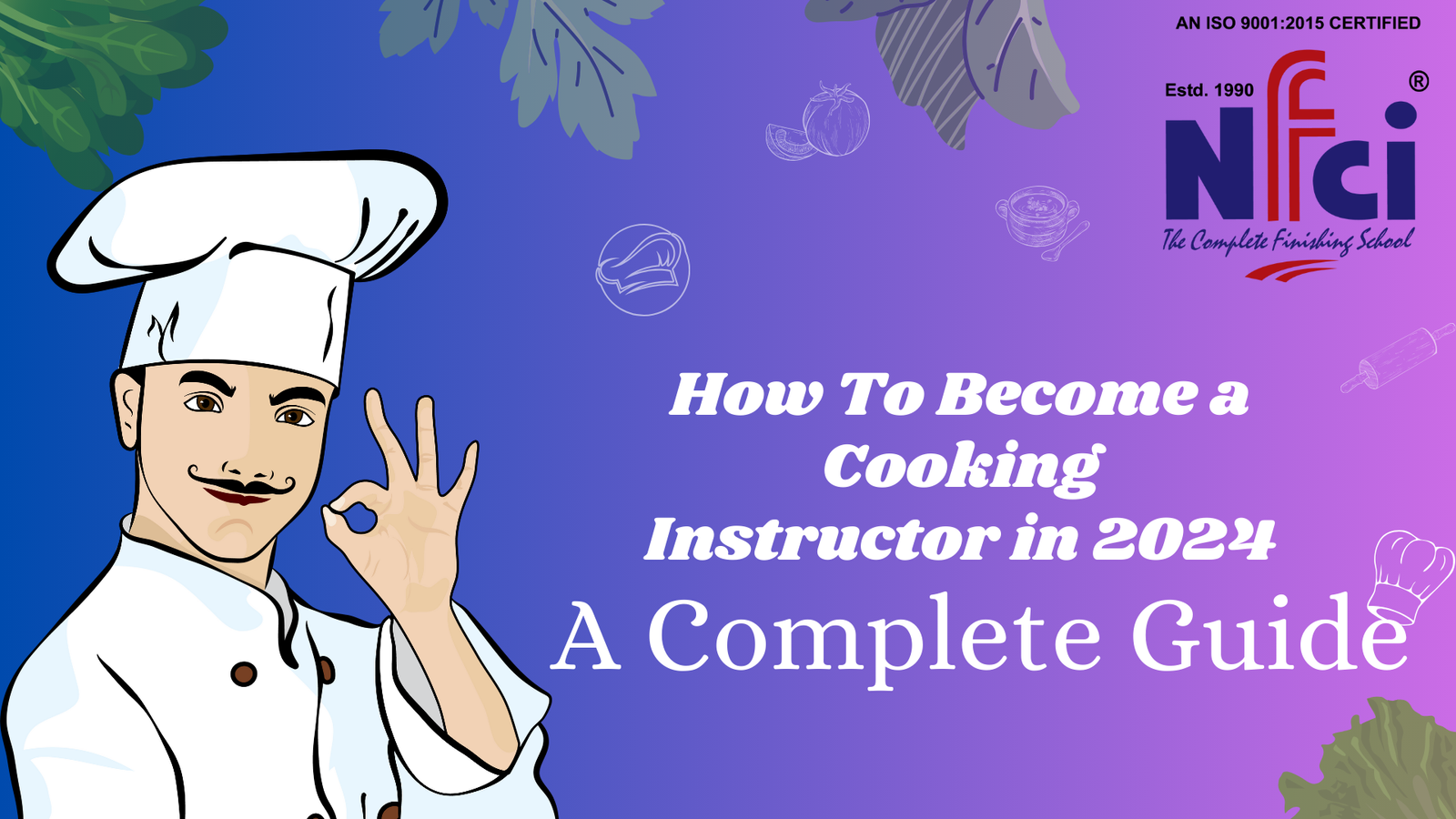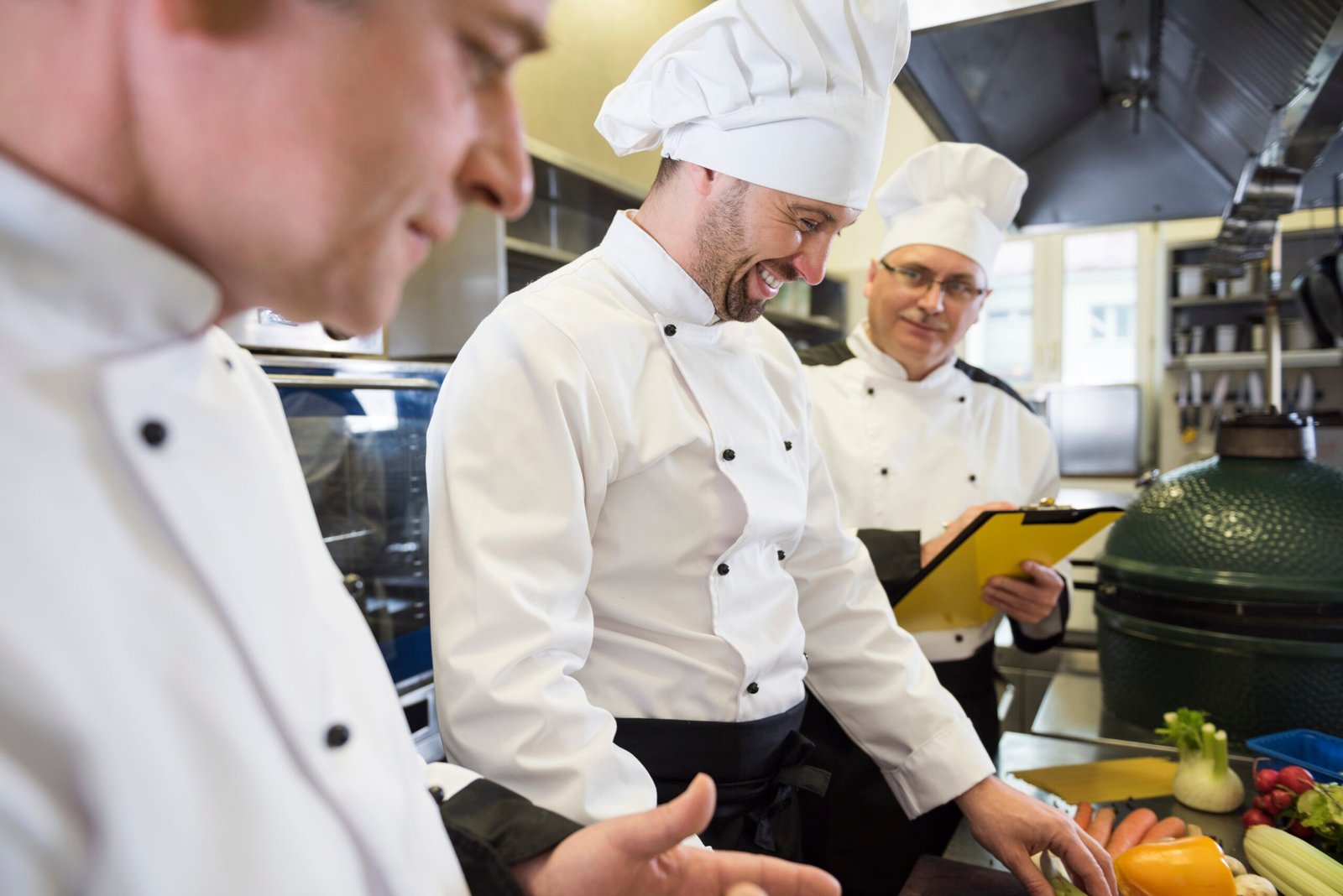
Turning Kitchen Passion Into Cooking Expertise: Your Guide to Becoming a Cooking Instructor
Introduction
No one is born a great cook, one learns by doing.” — Julia Child
Being a cooking instructor isn’t a straightaway path to success and excellence.
For some, the journey starts at their home kitchen counter, and for others, it involves attending fancy culinary classes at institutions. It could be a familial relation introducing them to cooking, while others might undergo extensive training from seasoned professionals.
While some chefs deviate their paths to become experts in restaurant and hotel kitchens, bakeries, or other culinary establishments, some aspire to take a mentoring spot in shaping bright minds for hospitality/culinary careers.
Stepping into the glorifying profession of a cooking instructor demands not just the polished presentation of culinary skills learned over the years but also a wealth of patience, support, and determination to guide the coming generation of chefs.
From creating a good learning environment to building a community inside the classrooms, cooking instructors play a vital role in shaping the future of culinary and hospitality professionals.
In this article, we’ll explain to you the prime facets of culinary professionals, their roles and responsibilities, and the ways chefs can embark on their journey to become culinary teachers.
Who is a cooking instructor?
A cooking instructor is a culinary professional with a wealth of expertise in cooking techniques and kitchen management. Be it foundational theoretical knowledge or practical aspects, his/her prime role is to instil culinary and hospitality knowledge and skills in students or enthusiasts aspiring to enter the field.
Culinary teachers bring insights from their work experience and background. From being a culinary degree holder to obtaining various certifications, their major goal is to set other aspiring individuals on their path to obtaining culinary success. You may find cooking instructors teaching in culinary schools or running their private lessons in both offline and online settings.
What are the roles and responsibilities of a chef instructor?
The roles and responsibilities of a chef instructor means performing certain duties –
- Designing curriculum and delivery
- Planning and Organising classes
- Managing equipment and supplies
- Teaching culinary techniques
- Handing out assignments
- Conducting live cooking demonstrations
- Providing theoretical knowledge
- Hands-On Training
- Creating and adapting recipes
- Ensuring industry relevance of curriculum
- Providing constructive feedback for improvement
- Presenting and creating decorative food displays
- Staying informed about current trends, techniques, and developments in the culinary industry
- Fostering a collaborative learning environment
- Offering mentorship and guidance to students
- Evaluating student needs and adjusting
- Engaging in ongoing professional development
- Adherence to Safety Standards
- Collaborating with other instructors, culinary professionals, and industry partners
- Managing kitchen efficiently
- Networking with industry professionals
- Organising culinary events and competitions
- Maintaining a safe and sanitary learning environment
- Managing equipment and supplies
These are some of the routine responsibilities of a culinary professional, which ensure their role in fostering effectiveness in the dynamic culinary environment.
How to become a cooking instructor?

Here is the roadmap to becoming a culinary instructor. Follow these steps and pave your way towards a rewarding career in culinary education.
Get yourself a culinary degree
While cooking will be the only profession that does not inherently require the pursuit of formal education, earning yourself an associated formal culinary education can help you bag the highest level of opportunities later on in your culinary career.
Keeping in mind multiple chef instructors running their lessons online, the traditional setting of classrooms does not apply to them. But if you want to build a future in the culinary industry, you must get yourself a reputed degree from a local community college or any culinary school.
You can get a bachelor’s degree from a reputed institution, and get greater exposure to the realm of culinary sciences. After that, you may even go ahead to pursue a master’s degree to equip yourself with the necessary leadership and mentorship skills to face a classroom.
Gain experience in working kitchen
Education can build a firm foundation for your cooking essentials, but to get your talent recognized to much higher standards, getting yourself real industrial experience helps you sharpen these skills.
Not all culinary arts teachers get into teaching straightway, but have served multiple roles in different business models. From serving as a managerial figure in catering companies to chefs in leading restaurants, they take on various responsibilities.
Many school administrations look out for candidates who hold significant three to five years of teaching experience. They need to prove their practical proficiency before becoming a faculty candidate since the exposure of running a kitchen entirely differs from leading a class.
Enhance your skills with certifications
This is my invariable advice to people: Learn how to cook — try new recipes, learn from your mistakes, be fearless and above all have fun!” — Julia Child
There are multiple certifications available in the market that cooking instructors can have in their culinary careers. You can find these on various online platforms as well as reputed colleges like NFCI that provide you the flexibility to complete cooking training courses at your own pace. These short-term courses do not just enhance efficiency but add credibility under your wings.
Seek opportunities
After successful completion of your education and accumulating enough certifications for your resume, make sure to look out for exciting teaching opportunities. Your chances to grab a teaching position become even brighter if you can prove your expertise in your professional background. Once you secure a teaching role, pour in your passion and enthusiasm to inspire other aspiring chefs to excel in the culinary arts.
Types of chefs in culinary career
Online vs. On-Campus Chef Instructors
The main difference between online and on-campus chef instructors is their ability to provide flexibility and convenience to students. While students with personal commitments and schedules may prefer online chef instructors, the ones seeking in-person learning experience might be more inclined towards traditional classroom settings.
Moreover, online culinary instructors need to possess more technical knowledge compared to on-campus, as they need to face cameras for recording videos or streaming live for virtual classrooms. Their feedback goes through virtual interactions and mostly relies on digital connections, in contrast to on-campus instructors face-to-face interactions are prominent.
Secondary vs. Post-Secondary Chef Instructors
Chef instructors can find roles for themselves in both secondary and post-secondary institutions. Secondary-chef instructors may teach high-school students focussing on providing foundational skills. On the other hand, post-secondary chef instructors cater to individuals requiring a specialised level of education in the field, offering more comprehensive and in-depth training.
The prime focus of the two roles varies, with secondary instructors concentrating on building foundational skills, while post-secondary instructors delve into more advanced and specialised aspects of culinary education. While both levels of culinary teachers aim to educate students, develop their professional skills, and inspire a passion for the culinary arts, the two differ significantly in the depth and complexity.
What are some cooking training courses?
- Complete Knife Skills: Your Essential Guide to Culinary Confidence
- Chinese And Continental
- Cooking Basics for Everyone
- Commis Chef
- Assistant Chef
- Front Office Operations
- Customer Service Executive
- Indian Cuisine Cooking
- Mastering Pasta: The Art of Italian Cooking
- Housekeeping Supervisor
- Food and Beverage Service Associate
- The Art of Sourdough Bread Baking
- Pastry School: 101
- Knife Skills: A Mini-Course to Chop Like a Chef
- Pastry/Baker Commis
- Healthy Cooking Fundamentals
- Wine and Food Pairing: A Sensory Experience
- Catering Management
- The Plant-Based Lifestyle Cooking Program
- Food Production
- Local vegetarian or vegan cooking classes
- Food Photography: From Plate to Photo
- Cookery & Bakery
If you want a detailed list of cooking certifications, diplomas, and bachelor courses, check out our guide to Best Cooking Courses & Certifications To Elevate Your Culinary Skills
Get Yourself Enrolled in NFCI For Cooking training in Ludhiana
If you are asking why you need to trust Ludhiana’s most-reputed institute NFCI, then let us list down a few reasons for you.
- A robust infrastructure with a conducive environment promoting high-standard education and innovation.
- Modern learning spaces are equipped with technologically advanced tools, classrooms, and labs.
- Experienced and dedicated faculty that takes a holistic approach in account to equip students with both practical and theoretical insights.
- Meticulously designed curriculum to pep up students with diverse facets of hotel management.
- Curriculum alignment with industrial and international standards to prepare students for global opportunities.
If these reasons are not enough to strengthen your trust in the National Finishing and Cooking Institute, then you should surely take a look at its more than 34 years of esteemed heritage it boasts.
Along with this, it has more than 28.000 student success stories and multiple advanced certified career-oriented courses that underscore its commitment to providing its students with excellence. This prepares them not only for multiple leading positions in the hospitality industry but also polishing their entrepreneurship skills 1. to the finest.
Also learn: Best Cooking Skills to Learn as a Chef





